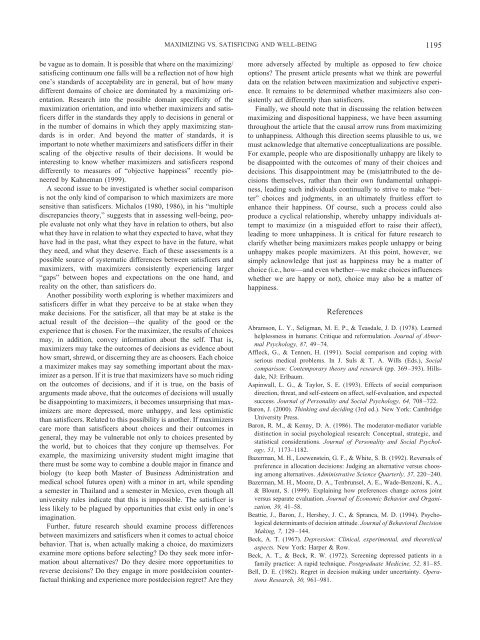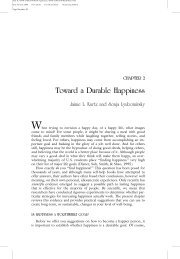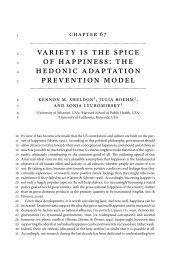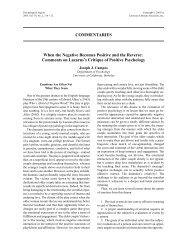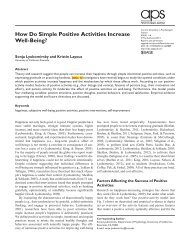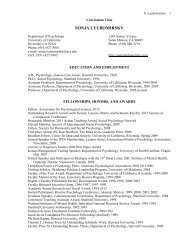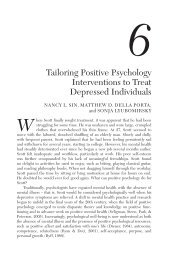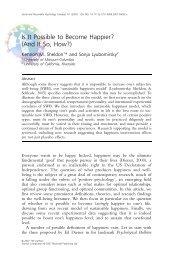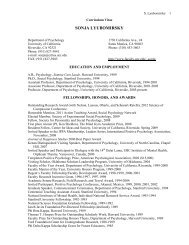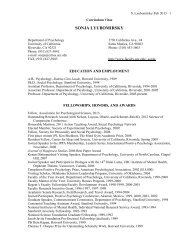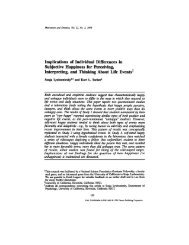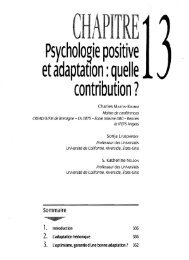Maximizing Versus Satisficing: Happiness Is a Matter of Choice
Maximizing Versus Satisficing: Happiness Is a Matter of Choice
Maximizing Versus Satisficing: Happiness Is a Matter of Choice
Create successful ePaper yourself
Turn your PDF publications into a flip-book with our unique Google optimized e-Paper software.
MAXIMIZING VS. SATISFICING AND WELL-BEING<br />
1195<br />
be vague as to domain. It is possible that where on the maximizing/<br />
satisficing continuum one falls will be a reflection not <strong>of</strong> how high<br />
one’s standards <strong>of</strong> acceptability are in general, but <strong>of</strong> how many<br />
different domains <strong>of</strong> choice are dominated by a maximizing orientation.<br />
Research into the possible domain specificity <strong>of</strong> the<br />
maximization orientation, and into whether maximizers and satisficers<br />
differ in the standards they apply to decisions in general or<br />
in the number <strong>of</strong> domains in which they apply maximizing standards<br />
is in order. And beyond the matter <strong>of</strong> standards, it is<br />
important to note whether maximizers and satisficers differ in their<br />
scaling <strong>of</strong> the objective results <strong>of</strong> their decisions. It would be<br />
interesting to know whether maximizers and satisficers respond<br />
differently to measures <strong>of</strong> “objective happiness” recently pioneered<br />
by Kahneman (1999).<br />
A second issue to be investigated is whether social comparison<br />
is not the only kind <strong>of</strong> comparison to which maximizers are more<br />
sensitive than satisficers. Michalos (1980, 1986), in his “multiple<br />
discrepancies theory,” suggests that in assessing well-being, people<br />
evaluate not only what they have in relation to others, but also<br />
what they have in relation to what they expected to have, what they<br />
have had in the past, what they expect to have in the future, what<br />
they need, and what they deserve. Each <strong>of</strong> these assessments is a<br />
possible source <strong>of</strong> systematic differences between satisficers and<br />
maximizers, with maximizers consistently experiencing larger<br />
“gaps” between hopes and expectations on the one hand, and<br />
reality on the other, than satisficers do.<br />
Another possibility worth exploring is whether maximizers and<br />
satisficers differ in what they perceive to be at stake when they<br />
make decisions. For the satisficer, all that may be at stake is the<br />
actual result <strong>of</strong> the decision—the quality <strong>of</strong> the good or the<br />
experience that is chosen. For the maximizer, the results <strong>of</strong> choices<br />
may, in addition, convey information about the self. That is,<br />
maximizers may take the outcomes <strong>of</strong> decisions as evidence about<br />
how smart, shrewd, or discerning they are as choosers. Each choice<br />
a maximizer makes may say something important about the maximizer<br />
as a person. If it is true that maximizers have so much riding<br />
on the outcomes <strong>of</strong> decisions, and if it is true, on the basis <strong>of</strong><br />
arguments made above, that the outcomes <strong>of</strong> decisions will usually<br />
be disappointing to maximizers, it becomes unsurprising that maximizers<br />
are more depressed, more unhappy, and less optimistic<br />
than satisficers. Related to this possibility is another. If maximizers<br />
care more than satisficers about choices and their outcomes in<br />
general, they may be vulnerable not only to choices presented by<br />
the world, but to choices that they conjure up themselves. For<br />
example, the maximizing university student might imagine that<br />
there must be some way to combine a double major in finance and<br />
biology (to keep both Master <strong>of</strong> Business Administration and<br />
medical school futures open) with a minor in art, while spending<br />
a semester in Thailand and a semester in Mexico, even though all<br />
university rules indicate that this is impossible. The satisficer is<br />
less likely to be plagued by opportunities that exist only in one’s<br />
imagination.<br />
Further, future research should examine process differences<br />
between maximizers and satisficers when it comes to actual choice<br />
behavior. That is, when actually making a choice, do maximizers<br />
examine more options before selecting? Do they seek more information<br />
about alternatives? Do they desire more opportunities to<br />
reverse decisions? Do they engage in more postdecision counterfactual<br />
thinking and experience more postdecision regret? Are they<br />
more adversely affected by multiple as opposed to few choice<br />
options? The present article presents what we think are powerful<br />
data on the relation between maximization and subjective experience.<br />
It remains to be determined whether maximizers also consistently<br />
act differently than satisficers.<br />
Finally, we should note that in discussing the relation between<br />
maximizing and dispositional happiness, we have been assuming<br />
throughout the article that the causal arrow runs from maximizing<br />
to unhappiness. Although this direction seems plausible to us, we<br />
must acknowledge that alternative conceptualizations are possible.<br />
For example, people who are dispositionally unhappy are likely to<br />
be disappointed with the outcomes <strong>of</strong> many <strong>of</strong> their choices and<br />
decisions. This disappointment may be (mis)attributed to the decisions<br />
themselves, rather than their own fundamental unhappiness,<br />
leading such individuals continually to strive to make “better”<br />
choices and judgments, in an ultimately fruitless effort to<br />
enhance their happiness. Of course, such a process could also<br />
produce a cyclical relationship, whereby unhappy individuals attempt<br />
to maximize (in a misguided effort to raise their affect),<br />
leading to more unhappiness. It is critical for future research to<br />
clarify whether being maximizers makes people unhappy or being<br />
unhappy makes people maximizers. At this point, however, we<br />
simply acknowledge that just as happiness may be a matter <strong>of</strong><br />
choice (i.e., how—and even whether—we make choices influences<br />
whether we are happy or not), choice may also be a matter <strong>of</strong><br />
happiness.<br />
References<br />
Abramson, L. Y., Seligman, M. E. P., & Teasdale, J. D. (1978). Learned<br />
helplessness in humans: Critique and reformulation. Journal <strong>of</strong> Abnormal<br />
Psychology, 87, 49–74.<br />
Affleck, G., & Tennen, H. (1991). Social comparison and coping with<br />
serious medical problems. In J. Suls & T. A. Wills (Eds.), Social<br />
comparison: Contemporary theory and research (pp. 369–393). Hillsdale,<br />
NJ: Erlbaum.<br />
Aspinwall, L. G., & Taylor, S. E. (1993). Effects <strong>of</strong> social comparison<br />
direction, threat, and self-esteem on affect, self-evaluation, and expected<br />
success. Journal <strong>of</strong> Personality and Social Psychology, 64, 708–722.<br />
Baron, J. (2000). Thinking and deciding (3rd ed.). New York: Cambridge<br />
University Press.<br />
Baron, R. M., & Kenny, D. A. (1986). The moderator-mediator variable<br />
distinction in social psychological research: Conceptual, strategic, and<br />
statistical considerations. Journal <strong>of</strong> Personality and Social Psychology,<br />
51, 1173–1182.<br />
Bazerman, M. H., Loewenstein, G. F., & White, S. B. (1992). Reversals <strong>of</strong><br />
preference in allocation decisions: Judging an alternative versus choosing<br />
among alternatives. Administrative Science Quarterly, 37, 220–240.<br />
Bazerman, M. H., Moore, D. A., Tenbrunsel, A. E., Wade-Benzoni, K. A.,<br />
& Blount, S. (1999). Explaining how preferences change across joint<br />
versus separate evaluation. Journal <strong>of</strong> Economic Behavior and Organization,<br />
39, 41–58.<br />
Beattie, J., Baron, J., Hershey, J. C., & Spranca, M. D. (1994). Psychological<br />
determinants <strong>of</strong> decision attitude. Journal <strong>of</strong> Behavioral Decision<br />
Making, 7, 129–144.<br />
Beck, A. T. (1967). Depression: Clinical, experimental, and theoretical<br />
aspects. New York: Harper & Row.<br />
Beck, A. T., & Beck, R. W. (1972). Screening depressed patients in a<br />
family practice: A rapid technique. Postgraduate Medicine, 52, 81–85.<br />
Bell, D. E. (1982). Regret in decision making under uncertainty. Operations<br />
Research, 30, 961–981.


